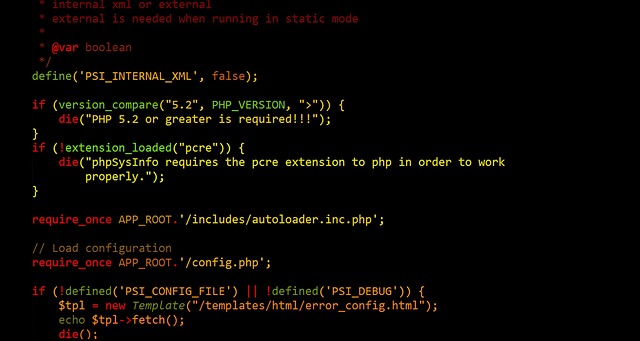In the ever-evolving landscape of web development, security is of paramount importance. As PHP remains one of the most widely used programming languages for web applications, it is crucial to ensure that the code powering these applications is secure. Static code analysis is a potent tool in the arsenal of web developers and security experts alike. In this article, we will explore the significance of securing PHP code with static analysis, its benefits, and how it can be effectively implemented.
The Need for PHP Code Security
With the increasing frequency and sophistication of cyberattacks, web applications are prime targets for malicious actors. Vulnerabilities in PHP code can expose sensitive data, compromise user privacy, and lead to financial losses. Therefore, proactive measures to identify and rectify security flaws are essential.
Static analysis is a technique that involves examining source code before it is executed to identify potential vulnerabilities and security weaknesses. Unlike dynamic analysis, which requires running the code, static analysis is performed without executing the application. This makes it a valuable approach for identifying issues early in the development process.
If you’re looking for skilled PHP developers to enhance your web application security and development efforts, check out Lemon.io at https://lemon.io/hire-php-developers/ to find the talent you need.
The Benefits of Static Analysis
- Early Detection of Vulnerabilities: Static analysis tools can identify security vulnerabilities at the code-writing stage, allowing developers to address issues before they make it into production. This proactive approach reduces the risk of security breaches.
- Cost-Efficient: Detecting and fixing security vulnerabilities early in the development process is significantly more cost-effective than addressing them after an application is in production. The cost of remediation increases exponentially with the application’s complexity and the stage at which vulnerabilities are discovered.
- Improved Code Quality: Static analysis not only identifies security flaws but also helps improve overall code quality. Developers receive feedback on code readability, maintainability, and best practices, leading to more robust applications.
- Compliance with Security Standards: Many industries and regulatory bodies require adherence to specific security standards and practices. Static analysis tools can help ensure compliance with these standards by identifying non-compliant code segments.
- Enhanced Developer Productivity: Developers can use static analysis tools to catch common coding mistakes, reducing the time spent on debugging and troubleshooting.
Common PHP Security Vulnerabilities
Before delving into how static analysis can secure PHP code, it’s essential to understand some common security vulnerabilities prevalent in PHP applications:
- SQL Injection: Occurs when user input is improperly sanitized and allows malicious SQL queries to be executed, potentially compromising the database.
- Cross-Site Scripting (XSS): A vulnerability that enables attackers to inject malicious scripts into web pages viewed by other users.
- Cross-Site Request Forgery (CSRF): Exploits the trust a user has for a particular site to perform unauthorized actions on their behalf.
- Insecure Session Management: Weak session management can lead to session fixation or session hijacking attacks.
- Code Injection: Allows attackers to execute arbitrary code on the server by manipulating input data.
- File Upload Vulnerabilities: Improper validation of file uploads can lead to the execution of malicious scripts on the server.
Implementing Static Analysis for PHP Code Security
Now that we understand the importance of securing PHP code, let’s explore how to implement static analysis effectively:
Choose the Right Static Analysis Tool
Selecting the appropriate static analysis tool is crucial. Some popular choices for PHP code analysis include:
- PHPStan: A static analysis tool that focuses on finding bugs and improving the quality of PHP code.
- Psalm: A type-focused static analysis tool for PHP that checks type correctness and uncovers potential issues.
- PHP CodeSniffer: Helps ensure code adherence to coding standards and identifies potential vulnerabilities.
- ESLint (for JavaScript): If your PHP application incorporates JavaScript, consider using ESLint for static analysis of JavaScript code.
Integrate into Your Development Workflow
Static analysis should be integrated into your development workflow. Developers can run these tools locally during development and also include them in continuous integration (CI) pipelines to catch issues early.
Set Up Coding Standards
Establish coding standards for your PHP project and configure your static analysis tool to enforce them. Consistent coding standards not only improve code readability but also help prevent common vulnerabilities.
Regular Scanning and Reporting
Perform regular scans of your PHP codebase with the static analysis tool. Ensure that any identified issues are reported to the development team promptly. Many static analysis tools can generate reports in various formats, making it easier to track issues and progress over time.
Remediation and Review
Address the issues detected by the static analysis tool promptly. Developers should review the findings, understand the root causes of vulnerabilities, and implement necessary fixes. Encourage collaboration between development and security teams to ensure that security issues are resolved effectively.
Training and Education
Invest in training and education for your development team to ensure that they understand the significance of security and are proficient in using static analysis tools effectively. Promote a security-conscious culture within your organization.
Conclusion
Securing PHP code with static analysis is an indispensable practice in modern web development. By identifying vulnerabilities early in the development process, static analysis tools contribute significantly to the overall security and reliability of web applications. Additionally, they improve code quality, reduce development costs, and enhance developer productivity.
As the digital landscape continues to evolve, the proactive identification and mitigation of security vulnerabilities in PHP code have become imperative. Embracing static analysis as a fundamental part of your development workflow can help you stay ahead in the ongoing battle against cyber threats, ensuring that your PHP-powered web applications remain resilient and trustworthy.










